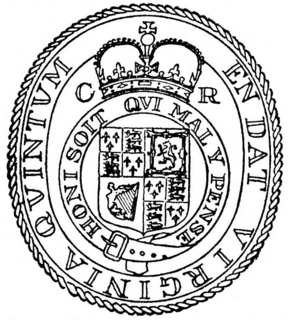 W
WAn Act for prohibiting Trade with the Barbadoes, Virginia, Bermuda and Antego or Act prohibiting Commerce and Trade with the Barbodoes, Antigo, Virginia, and Bermudas alias Summer's Islands was an Act of law passed by the Rump Parliament of England during the Interregnum against English colonies which sided with the Crown in the English Civil War.
 W
WThe Battle of the Severn was a skirmish fought on March 25, 1655, on the Severn River at Horn Point, across Spa Creek from Annapolis, Maryland, in what at that time was referred to as the Puritan settlement of "Providence", and what is now the neighborhood of Eastport.
 W
WThe Bermuda Garrison was the military establishment maintained on the British Overseas Territory and Imperial fortress of Bermuda by the regular British Army and its local militia and voluntary reserves from 1701 to 1957. The garrison evolved from an independent company, to a company of Royal Garrison Battalion during the American War of Independence, and a steadily growing and diversifying force of artillery and infantry with various supporting corps from the French Revolution onwards. During the American War of Independence, the garrison in Bermuda fell under the military Commander-in-Chief of North America. Subsequently, it was part of the Nova Scotia Command until 1868, and was an independent Bermuda Command from then 'til its closure in 1957.
 W
WThe Eleutheran Adventurers were a group of English Puritans and religious Independents who left Bermuda to settle on the island of Eleuthera in the Bahamas in the late 1640s. The small group of Puritan settlers, led by a man named William Sayle, were expelled from Bermuda for their failure to swear allegiance to the Crown, and left in search of a place in which they could freely practice their faith. This group represented the first concerted European effort to colonize the Bahamas.
 W
WThe Maryland Toleration Act, also known as the Act Concerning Religion, was religious tolerance for Trinitarian Christians. It was passed on April 21, 1649, by the assembly of the Maryland colony, in St. Mary's City. It was the second law requiring religious tolerance in the British North American colonies and created one of the pioneer statutes passed by the legislative body of an organized colonial government to guarantee any degree of religious liberty. Specifically, the bill, now usually referred to as the Toleration Act, granted freedom of conscience to all Christians. Historians argue that it helped inspire later legal protections for freedom of religion in the United States. The Calvert family, who founded Maryland partly as a refuge for English Catholics, sought enactment of the law to protect Catholic settlers and those of other religions that did not conform to the dominant Anglicanism of Britain and her colonies.
 W
WThe Plundering Time (1644–1646), also known as "Claiborne and Ingle's Rebellion", was a period of civil unrest and lawlessness in the English colony of the Province of Maryland.
 W
WVirginia Cavaliers were royalist supporters in the Royal Colony of Virginia at various times during the era of the English Civil War and Restoration.
 W
WThe Western Design is the term commonly used for an English expedition against the Spanish West Indies during the 1654 to 1660 Anglo-Spanish War.